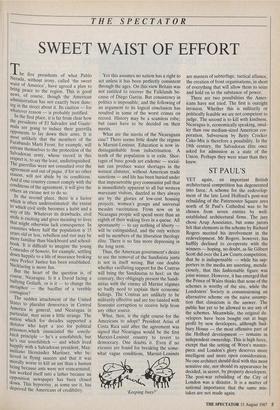THE SPECTATOR
SWEET WAIST OF EFFORT
The five presidents of what Pablo Neruda, without irony, called `the sweet waist of America', have agreed a plan to bring peace to the region. This is good news, of course, though the American administration has not exactly been danc- ing in the street about it. Its caution — for whatever reason — is probably justified.
In the first place, it is far from clear how the presidents of El Salvador and Guate- mala are going to induce their guerrilla opponents to lay down their arms. It is most unlikely that the members of the Farabundo Marti Front, for example, will entrust themselves to the protection of the Salvadoran army, whose record in this respect is, to say the least, undistinguished. The guerrillas were not consulted over the agreement and out of pique, if for no other reason, will not abide by its conditions. And if one country cannot comply with the conditions of the agreement, it will give the others an excuse not to do so. In the second place, there is a factor which is often underestimated: the extent to which civil strife becomes a habit and a way of life. Whatever its drawbacks, civil strife is exciting and gives meaning to lives that might otherwise lack consequence. In countries where half the population is 15 years old or less, rebellion and riot may be more familiar than blackboard and school- book. It is difficult to imagine the young Comrades of Soweto, for example, settling down happily to a life of insurance broking once Perfect Justice has been established. Necklacing is more fun. But the heart of the question is, of course, Nicaragua. Is it a David facing a bullying Goliath, or is it — to change the metaphor — the bacillus of a terrible contagion?
The sudden attachment of the United States to pluralist democracy in Central America in general, and Nicaragua in particular, may seem a little strange. The
nation which for decades supported a dictator who kept a zoo for political prisoners,which enunciated the sonofa- bitch principle — he's a sonofabitch, but
he's our sonofabitch — and which lived happily with a Salvadoran president, Max- imilian° Hernandez Martinez, who be- lieved in flying saucers and that it was morally worse to kill an ant than a human being because ants were not reincarnated, has worked itself into a lather because an opposition newspaper has been closed down. This hypocrisy, as some see it, has deprived the Americans of credibility. Yet this assumes no nation has a right to act unless it has been perfectly consistent through the ages. On this view Britain was not entitled to recover the Falklands be- cause of Diego Garcia. But consistency in politics is impossible; and the following of an argument to its logical conclusion has resulted in some of the worst crimes on record. History may be a seamless robe; but eases have to be decided on their merits.
What are the merits of the Nicaraguan case? There seems little doubt the regime is Marxist-Leninist. Education is now in- distinguishable from indoctrination. A tenth of the population is in exile. Shor- tages of basic goods are endemic — social- ism can produce water shortages in the wettest climates, without American trade sanctions — and life has been buried under that impenetrable grey communist pall that is immediately apparent to all but western marxisant visitors, dazzled as they always are by the glories of low-cost housing projects, women's groups and universal measles vaccination. From now on in Nicaragua people will spend more than an eighth of their waking lives in a queue. All spontaneity — to say nothing of liberty will be extinguished, and the only writers will be members of the liberation theology elite. There is no fate more depressing in the long term.
Thus, the American government's desire to see the removal of the Sandinista junta is not in itself wrong. But one doubts whether vacillating support for the Contras will bring the Sandinistas to heel: on the contrary, they obligingly present the Sandi- nistas with the enemy all Marxist regimes so badly need to explain their economic failings. The Contras are unlikely to be militarily effective and are too tainted with Somozist corruption to receive help from any other source.
What, then, is the right course for the Americans to adopt? President Arias of Costa Rica said after the agreement was signed that Nicaragua would be the first Marxist-Leninist country to revert to democracy. One doubts it. Even if no excuses are found for breaking the some- what vague conditions, Marxist-Leninsts are masters of subterfuge, tactical alliance, the creation of front organisations, in short of everything that will allow them to seize and hold on to the substance of power.
There are two possibilities the Amer- icans have not tried. The first is outright invasion. Whether this is militarily or politically feasible we are not, competent to judge. The second is to kill with kindness. Nicaragua is, economically speaking, smal- ler than one medium-sized American cor- poration. Subversion by Betty Crocker Cake-Mix is therefore a possibility. In the 19th century, the Salvadoran elite once asked for admission as a state of the Union. Perhaps they were wiser than they knew.


















































 Previous page
Previous page